

Ethical issues in teacher-led research. At the last research leads event at Cambridge, I raised the issue of ethical considerations where teachers engage in research.
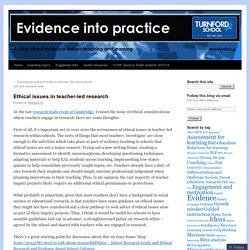
Here are some thoughts: First of all, it’s important not to over-state the seriousness of ethical issues in teacher-led research within schools. The sorts of things that most teachers ‘investigate’ are close enough to the activities which take place as part of ordinary teaching in schools that ethical issues are not a major concern: Trying out a new writing frame, creating a formative assessment to identify misconceptions, developing questioning techniques, adapting materials to help EAL students access learning, implementing low-stakes quizzes to help consolidate previously taught topics, etc. Teachers already have a duty of care towards their students and should simply exercise professional judgement when planning innovations in their teaching. BPS: Code of Human Research Ethics (The British Psychological Society, 2010) Minimising Harm “Minimising Harm.
Why the Growth Mindset is the Only Way to Learn. Top Ten Tips for developing a Growth Mindset in your Classroom. Be Critical.
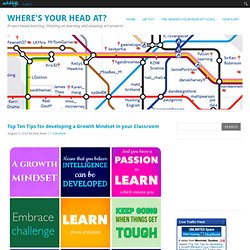
Students should expect and welcome criticism. They must also be given the opportunity to act on any criticism or critique. This will allow students to realise that through improving their work and responding to feedback, they can be better than they were. For this to happen, the culture of improvement needs to feel completely normal. As teachers, we also need to think about how and when we give feedback. Provide elements of choice. Imagine if every classroom, every teacher instilled this culture within your school.
Author: Pete Jones I am primarily an Art teacher, but over the past 5 years have been co-developing an experienced-based learning programme in the school I work in called Pebble, (short for Project Based Learning). The Learning Myth: Why I'll Never Tell My Son He's Smart. By: Salman Khan Join the #YouCanLearnAnything movement My 5-year-old son has just started reading.
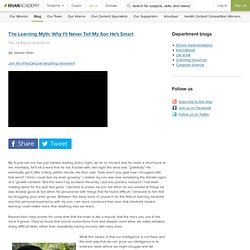
Every night, we lie on his bed and he reads a short book to me. Inevitably, he’ll hit a word that he has trouble with: last night the word was “gratefully.” He eventually got it after a fairly painful minute. Researchers have known for some time that the brain is like a muscle; that the more you use it, the more it grows. What this means is that our intelligence is not fixed, and the best way that we can grow our intelligence is to embrace tasks where we might struggle and fail.
However, not everyone realizes this. The good news is that mindsets can be taught; they’re malleable. Growth Mindset Maths - Growth Mindset Maths. New Research: Students Benefit from Learning That Intelligence Is Not Fixed. Arten Popov Teaching students that intelligence can grow and blossom with effort – rather than being a fixed trait they’re just born with – is gaining traction in progressive education circles.
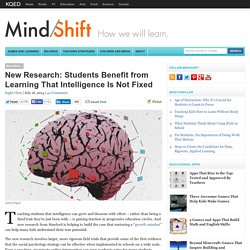
And new research from Stanford is helping to build the case that nurturing a “growth mindset” can help many kids understand their true potential. The new research involves larger, more rigorous field trials that provide some of the first evidence that the social psychology strategy can be effective when implemented in schools on a wide scale. Even a one-time, 30-minute online intervention can spur academic gains for many students, particularly those with poor grades. The premise is that these positive effects can stick over years, leading for example to higher graduation rates; but long-term data is still needed to confirm that.
However, all the original intervention studies were small and left some educators and policymakers unconvinced. Developing a growth mindset in the classroom. There’s a free info graphic version of this article.
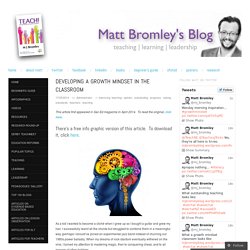
To download it, click here. As a kid I wanted to become a cliché when I grew up so I bought a guitar and grew my hair. I successfully learnt all the chords but struggled to combine them in a meaningful way (perhaps I should’ve joined an experimental jazz band instead of churning out 1980s power ballads). When my dreams of rock stardom eventually withered on the vine, I turned my attention to mastering magic, then to conquering chess, and to all manner of other hobbies. What all these childhood endeavours had in common – apart from their mutual failure – was that I took it for granted that I’d have to work hard at them, I knew I’d have to practise endlessly and that I wouldn’t become expert overnight.
I played that old six-string every night after school till my fingers bled, readily accepting that improvement would be incremental. Most of us feel this way about our interests. Becoming a growth mindset school. The idea of becoming a growth mindset school has been over a year in the making.
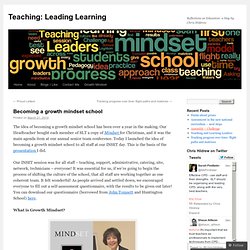
Our Headteacher bought each member of SLT a copy of Mindset for Christmas, and it was the main agenda item at our annual senior team conference. Today I launched the idea of becoming a growth mindset school to all staff at our INSET day. This is the basis of the presentation I did. Our INSET session was for all staff – teaching, support, administrative, catering, site, network, technicians – everyone! It was essential for us, if we’re going to begin the process of shifting the culture of the school, that all staff are working together as one coherent team. Brain Article.